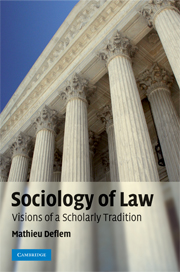Book contents
- Frontmatter
- Contents
- Preface and acknowledgements
- Introduction: sociology, society, law
- Part I Theoretical foundations of the sociology of law
- Part II Development and variations of the sociology of law
- 4 The theoretical move towards the sociological study of law
- 5 From sociological jurisprudence to sociology of law
- 6 Sociology of law and the antinomies of modern thought
- Part III Sociological dimensions of law
- Part IV Special problems of law
- Conclusion: Visions of the sociology of law
- Bibliography
- Index
5 - From sociological jurisprudence to sociology of law
Published online by Cambridge University Press: 05 June 2012
- Frontmatter
- Contents
- Preface and acknowledgements
- Introduction: sociology, society, law
- Part I Theoretical foundations of the sociology of law
- Part II Development and variations of the sociology of law
- 4 The theoretical move towards the sociological study of law
- 5 From sociological jurisprudence to sociology of law
- 6 Sociology of law and the antinomies of modern thought
- Part III Sociological dimensions of law
- Part IV Special problems of law
- Conclusion: Visions of the sociology of law
- Bibliography
- Index
Summary
The development of the sociology of law cannot be restricted to the history of sociology but must also consider elements in the history of legal thought, especially those emanations from legal scholarship claiming to be sociologically informed. This condition particularly applies to the United States, for when the first attempts were made in European sociology to carve out a niche for the sociology of law, there was at the time no such similar development in American sociology, where studies of law were conducted only very rarely in sociological scholarship (e.g., Gillin 1929; Thomas 1931). Instead, as an early precursor to the sociology of law there developed a perspective known as sociological jurisprudence. Established by Harvard law professor Roscoe Pound, sociological jurisprudence was an extension of the legal thought of the famous US jurist Oliver Wendell Holmes, Jr., who had formulated a conception of law as reflecting a nation's development. Inspired by Holmes and the turn towards a scientifically informed jurisprudence, sociological jurisprudence additionally paved the way for the school of legal realism, which benefited most from its systematization in the work of Karl Llewellyn.
The American traditions of sociological jurisprudence and legal realism take the place of the work of Petrazycki in Europe as being among the precursors towards the sociology of law. However, because these early schools in the United States were part of legal rather than sociological scholarship, an additional effort was needed from within sociology to establish the subfield of the sociology of law.
- Type
- Chapter
- Information
- Sociology of LawVisions of a Scholarly Tradition, pp. 97 - 116Publisher: Cambridge University PressPrint publication year: 2008



